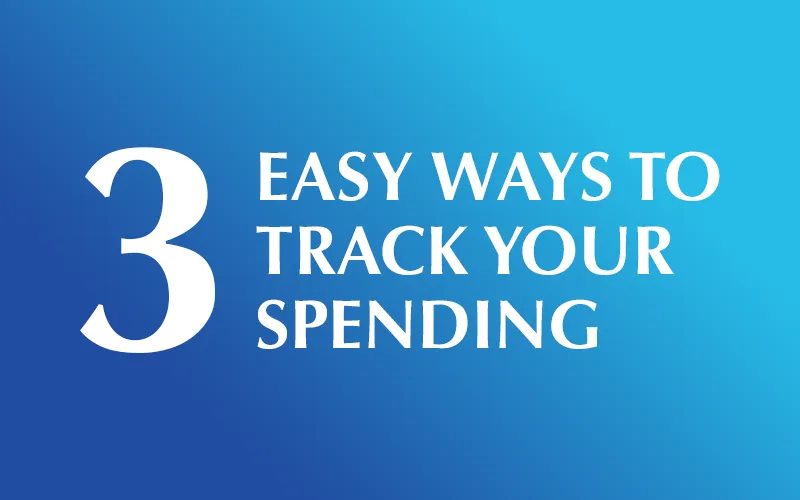
Blogs
Exploring Our Bank’s Services: Articles & Insights

3 Easy Ways to Track Your Spending in 2026
A new year is a natural time to reset your financial habits. Tracking your spending doesn’t have to be complicated—or time-consuming. With the right tools and a little intention, you can gain clarity, reduce stress, and steward your money with confidence in 2026.
Here are three simple ways to get started.
1. Use Your Banking App to Categorize Purchases
Your banking app is one of the most powerful budgeting tools you already have. By reviewing categorized transactions—like groceries, dining, or subscriptions—you can quickly see where your money is going each month.
This visibility helps you identify patterns, spot unnecessary spending, and make adjustments that align with your goals and values. A few minutes of review each week can make a big difference over time.
2. Set Weekly Spending Limits and Alerts
Instead of tracking every dollar, try setting weekly spending limits for key categories. Many banking apps allow you to create alerts when you’re approaching a limit, helping you stay on track without feeling restricted.
Weekly check-ins keep your finances manageable and prevent small overspending from turning into bigger issues—giving you peace of mind and greater control.
3. Automate Your Savings for Small, Consistent Growth
One of the easiest ways to build healthy financial habits is to automate them. Setting up automatic transfers—even small amounts—helps you save consistently without having to think about it.
At 316 Financial, we believe managing money is about stewardship and generosity. Just as we commit to tithing 10% of our profits, automating your savings can help you intentionally set aside resources for future needs, giving opportunities, and long-term goals—faithfully and consistently.
Ready to start saving with purpose?
Open a 316 Financial Savings Account today and take the first step toward smarter spending and intentional stewardship in 2026.

Safe Giving in a Digital World: Cybersecurity Tips for Donors
October is Cybersecurity Awareness Month, a reminder that protecting your finances goes beyond your bank account—it also includes how and where you give. At 316 Financial, we believe generosity should always be a blessing, not an opportunity for scammers to take advantage of your good heart. Sadly, charitable giving scams are on the rise, especially online. Here’s how to keep your giving safe and impactful.
1. Understand How Scammers Operate
Fraudsters often pose as legitimate charities, using emotional stories, fake websites, or even text messages to trick people into giving. They know that generous givers act quickly and trust deeply.
Red flags to watch for:
- Urgent pressure to give right now
- Requests for donations via gift cards, wire transfers, or cryptocurrency
- Misspelled websites or unusual email addresses
- No clear information about how donations will be used
2. Verify Before You Give
Take a few extra minutes to confirm that an organization is legitimate. Trusted tools like Charity Navigator, the Better Business Bureau’s Wise Giving Alliance, or GuideStar can help. If you’re unsure, contact the organization directly using a verified phone number or website.
3. Give Through Secure Channels
Always donate through a secure website (look for “https://” and the padlock symbol). Avoid clicking on links from unsolicited emails or social media messages, no matter how convincing they look.
4. Keep Records of Your Giving
Document your donations and keep receipts. Not only does this help with tax reporting, but it also ensures you can quickly identify if something doesn’t look right.
5. Trust, but Be Wise
As believers, we’re called to give cheerfully (2 Corinthians 9:7), but we’re also called to be wise stewards. Protecting your resources allows you to bless real ministries and causes that are truly making a difference.
Generosity is powerful when it reaches the right hands. This Cybersecurity Awareness Month, let’s commit to giving with both open hearts and wise minds. At 316 Financial, we’re here to help you steward your finances—and your giving—with confidence.

Protecting Seniors from Financial and Cyber Scams
Every year, scammers steal millions of dollars from older adults by preying on trust, routine, and the desire to help others. Senior Citizens Day, observed on August 21, is a reminder to honor the wisdom and contributions of older generations—and to protect them from those who would take advantage.
Popular Scams Targeting Seniors Right Now
- Tech Support Scams
A caller or pop-up claims your computer has a virus and offers to “fix” it for a fee. In reality, they’re after your credit card number or remote access to your device. - Imposter Scams
Fraudsters pretend to be government officials, bank representatives, or even family members. The message is always urgent: send money now or face serious consequences. - Fake Sweepstakes
Victims are told they’ve won a prize—but must first pay taxes or fees to claim it. The winnings never arrive. - Romance Scams
Online scammers build relationships through dating sites or social media, then ask for money to cover emergencies or travel. - Medicare and Health Scams
Fraudsters pose as Medicare representatives, asking for personal or payment information under the guise of providing benefits.
How to Stay Safe
- Slow down. Scammers thrive on urgency. Pause before giving out information or sending money.
- Verify the source. Call the company, government agency, or family member directly using a number you know is legitimate.
- Guard your information. Never share Social Security, Medicare, or bank account numbers over the phone, email, or text.
- Use strong passwords. Add extra protection with multifactor authentication whenever possible.
- Talk openly. Families can help by discussing common scams and encouraging loved ones to check in before making financial decisions.
Looking Out for Loved Ones
Seniors aren’t alone in facing these threats. Family members, friends, and caregivers all play a role in keeping them safe. Check in often, talk about the latest scams, and make sure they feel comfortable asking questions before taking action.

Faith & Finances on the Go
Summer is a time for travel, rest, and family, but your faith and finances still matter. Whether you’re hitting the road or just slowing down your pace, here are a few ways to stay intentional with your time, money, and mindset this season.
1. Pack Light, Give Big
Vacation is a great time to declutter, not just your suitcase, but your habits too. What can you simplify? Where can you give more generously, even in small ways?
🧳 Tip: Use the money you saved by skipping that extra dinner out to bless someone else—whether it’s a tithe, donation, or a kind gesture.
2. Stewardship Doesn’t Stop at State Lines
Being a good steward doesn’t take a vacation. With tools like mobile banking, budgeting apps, and account alerts, you can keep tabs on your spending and stay intentional no matter where you are.
📱 Tip: Set up travel notifications or account alerts before you hit the road.
3. Make Room for Sabbath Moments
True rest is more than just time off. Carving out time to pray, reflect, or simply unplug can restore your spirit and your perspective.
🌿 Tip: Block out 10 minutes each morning—even on vacation—to start the day with peace, prayer, or reflection.
4. Spend with Purpose
Summer can be full of impulse buys. Before you swipe your card or click "add to cart," pause and ask: Does this purchase support my values?
🛍️ Tip: Try journaling one purchase each week that brought true value or meaning.
5. Faith on the Road
You don’t need to be home, or in church, to feel connected to your faith. Podcasts, Bible apps, and playlists can help you stay grounded on the go.
🎧 Tip: Download a favorite devotional, sermon or podcast before your next road trip.
Wherever this summer takes you, stay rooted in what matters most. Faith. Purpose. Stewardship.
Need help setting up alerts or reviewing your accounts? We’re here to help.

5 Ways to Protect Your Finances While You Travel
Summer travel should bring peace, not panic. Whether you're visiting family, heading out on a mission trip, or taking a well-earned break, it's important to safeguard what’s been entrusted to you.
These simple steps can help you protect your personal info, your accounts, and your peace of mind—so you can stay focused on what matters.
- Use Secure Wi-Fi (or skip it).
Avoid checking your accounts or making purchases over public Wi-Fi, especially in airports or hotels. If needed, use a secure hotspot or VPN. - Enable account alerts.
Turn on transaction alerts and low balance notifications in your banking app so you’re instantly aware of any suspicious activity. - Don’t post travel plans publicly.
Sharing that you're out of town can make you an easy target for scammers or identity theft. Keep details private or wait to share after your trip. - Be cautious with ATMs.
Use only ATMs from trusted banks in well-lit areas. Avoid standalone machines and always check for card skimmers before inserting your card. - Carry only what you need.
Bring just one debit or credit card (plus a backup stored separately). Leave unnecessary cards or documents at home to limit your risk.
Being a good steward includes staying alert. A few quick precautions can help you travel with confidence—knowing your finances and your faith are both covered.

From House to Home: 5 Homeownership Habits
June is National Homeownership Month—a time to celebrate the value of homeownership and the impact it has on families, neighborhoods, and futures.
Owning a home is more than a milestone. It’s a foundation for stability, independence, and long-term financial growth. And like any good investment, it works best when you manage it with intention.
Here are five habits every homeowner should keep in their toolkit:
1. Budget for the Unexpected
Homeownership comes with surprises—some small, some expensive. From appliance repairs to rising utility costs, preparing for the unexpected keeps you ahead of the stress.
✅ Set aside a little each month in a dedicated home fund. It’ll help you avoid debt and keep things running smoothly when life happens.
Pro tip: Set aside a savings account, just to prep for the unexpected.
2. Build Equity—and Know What It Means
Every mortgage payment you make helps build equity in your home, which can be a valuable financial resource down the road.
✅ Stay informed about your home’s market value and understand how equity works. It can open the door to future opportunities like renovations, investing, or long-term planning.
3. Revisit Your Mortgage Every Year
Markets change. Life changes. It’s smart to check in on your mortgage terms regularly.
✅ Consider an annual review to see if your loan still fits your needs. Whether it’s refinancing, updating your escrow, or just making sure you’re on track, a quick check-in can go a long way.
4. Protect Your Home—and Your Accounts
A home is more than walls—it’s where your personal and financial information lives, too.
✅ Use strong passwords, monitor your accounts, and be alert to scams—especially during busy seasons like summer. A little caution goes a long way in protecting what matters most. Click here to learn more about protecting what matters most.
5. Plan With Purpose
Whether you're saving for upgrades, preparing to host more, or building toward your next goal—having a clear plan helps.
✅ Set short- and long-term financial goals related to your home, and check in on them a few times a year. Thoughtful planning supports both your lifestyle and your financial health.
🏠 Here’s to Homeownership
Homeownership doesn’t just change your address—it can change your future.
This month, we celebrate the progress, potential, and possibilities that come with having a place to truly call your own.

Faith, Finances, and Fraud Protection
How to Be a Wise Steward This Summer
We believe every dollar has a purpose—and it's our job to help you protect what’s been entrusted to you. Whether you're heading into summer vacation mode or just trying to stay one step ahead of online threats, it's the perfect time to sharpen your financial security habits.
Here are 5 simple ways to keep your money and information safe this season—without losing your peace of mind.
1. Don’t Trust Every Text or Email
Scammers love pretending to be your bank, your utility provider, or even a ministry asking for donations. If you get a message asking you to click a link, log in, or “confirm” your information—pause.
What to do: Go directly to the official website or contact the organization through a known, trusted number. Never click on a link you weren’t expecting.
Remember: 316 will never call or text you asking you to provide details regarding your personal info or account, unless you prompt the call.
2. Use Alerts to Catch Trouble Early
Real-time text and app alerts are one of the easiest ways to spot fraud before it escalates. If someone makes a purchase or withdrawal, you’ll know instantly—and can take action.
What to do: Turn on transaction alerts in your 316 mobile app for every debit card purchase or login attempt.
3. Keep Your Access Personal and Protected
We trust the people closest to us—but financial security starts with personal responsibility. Even with good intentions, sharing your login can lead to accidental mix-ups or create openings for fraud.
What to do: Think of your account access like your house key: it’s best kept in your hands. If someone else needs access, let’s talk about safer ways to share information or set up the right account for their needs.
4. Avoid Public Wi-Fi for Financial Transactions
Airports, coffee shops, and hotel Wi-Fi networks are convenient—but not always secure. Logging into your bank or uploading sensitive documents over public Wi-Fi opens the door for hackers.
What to do: Use your phone’s data connection for banking tasks or wait until you're on a secure, private network.
5. Practice Purposeful Generosity, Safely
Giving to causes that matter is at the heart of what we do—but even generosity can be hijacked by fraudsters. Fake charities or spoofed donation sites are on the rise.
What to do: Always vet organizations before donating. If something feels off, it probably is. And when in doubt, reach out—we’re happy to help verify.
Your Financial Safety Is Part of Your Stewardship
Being a wise steward isn’t just about how you give—it’s also about how you guard what’s been entrusted to you. With a few simple habits and the right tools, you can move through summer with confidence, clarity, and care. Need help setting up alerts or reviewing your account? Call us any time.

Guarding What Matters: Staying Safe from Check Fraud
At 316, we believe managing money is more than math—it’s stewardship. That means not just giving generously, but protecting wisely. Whether you’re running a ministry, leading a business, or simply trying to live out your purpose, part of honoring God with your finances is guarding what He’s placed in your hands.
That’s why we want to talk about something that feels a little old-school but is still a very real threat: check fraud.
Wait, people still write checks?
They do—and scammers know it. In fact, check fraud is on the rise. Why? Because checks are physical, easy to alter, and often overlooked in a world where most people watch their debit cards but not their paper trail.
In 2023, the U.S. Postal Service and financial regulators issued warnings about a spike in mail-based check scams. And it’s not just a big-city problem. It’s happening in small towns, local churches, and nonprofit offices—often to people who are just trying to do good.
Who’s at risk?
Honestly? Anyone. But especially:
- Churches and ministries who receive check donations
- Small business owners who still pay vendors by check
- Older adults who prefer paper over digital
- Anyone who sends or receives checks by mail
What check scams look like
Scammers are getting creative—but here are a few red flags to watch for:
- You’re sent a check and asked to send money back. (They’ll say it’s a mistake or overpayment—then the check bounces.)
- The check amount seems off or more than expected.
- You spot smudged signatures, strange fonts, or different inks.
- You receive a check out of the blue—like a rebate, prize, or refund you didn’t ask for.
Simple ways to protect yourself
You don’t need a finance degree to outsmart a scam. Just take these small steps:
- Use online bill pay or ACH transfers instead of mailing checks
- Only deposit checks from people you know and trust
- Check your account activity weekly—don’t wait for statements
- Shred old checks and deposit slips before tossing them
- Report anything suspicious right away—to your bank and the authorities
Know that at 316, we’re doing everything we can to help you steward well and live with peace.
If you think you’ve been targeted or want to talk through your options, reach out. We’re here for you—always.

Teaching Kids to Save with Purpose
At 316 Financial, we believe that financial literacy for children isn't just a nice-to-have — it's essential. Teaching kids how to save money builds a strong foundation for lifelong financial responsibility and wise stewardship.
That’s why we’re celebrating National Teach Children to Save Day: a nationwide initiative dedicated to helping kids understand the value of money, the importance of saving, and how to develop smart money habits from an early age.
Why It’s Important to Teach Kids About Money Early
Just like planting a garden, teaching children about money requires time, patience, and consistency. But when we introduce saving and budgeting at a young age, we equip them with tools to become confident, generous, and responsible adults.
Easy and Engaging Ways to Teach Kids to Save
Want to know how to teach your child to save money? Here are some fun and practical ideas to get started:
- Tell a Story
Kids learn through storytelling. Share personal experiences about saving for something special or learning how to manage your money wisely. - Use the Jar System
Label three jars: “Give,” “Save,” and “Spend.” This visual method helps children understand basic budgeting and the purpose of each dollar. - Make It a Game
Use play money, savings apps, or board games like Monopoly Junior to introduce concepts like earning, spending, and saving in a fun and memorable way. - Celebrate Milestones
Whether they save $5 or $50, celebrate the achievement! Talk about the next goal and how they might reach it — this reinforces positive saving behavior.
Raising Financially Savvy Kids Is About More Than Money
Saving is more than just a financial skill. It’s also a form of intentional stewardship. When we teach children to save, we’re helping them grow into wise caretakers of their resources and blessings.
Additional Resources for Teaching Kids to Save
Looking for more ideas? Check out the Consumer Financial Protection Bureau’s Activities for Kids. You'll find free, age-appropriate resources to help build financial literacy at home.

Spring Cleaning for Your Finances: A Values-Based Approach
The days are getting longer, flowers are starting to bloom—spring is here! It’s the perfect time to refresh your home … and also take a closer look at your finances.
At 316 Financial, we believe managing money is about more than just numbers—it’s about aligning your financial decisions with your values. As you welcome spring with a fresh mindset, here are a few thoughtful ways to “spring clean” and uplift your money habits.
1. Reflect and Renew
Just like you open the windows and invite fresh air into your home, spring is a great time to open up your finances and clear out any junky habits. Is your current spending helping you live with purpose? Are your financial choices in line with what matters most to you? Take time to review your expenses, savings, and goals, and consider how your future decisions can better reflect the life you want to lead.
2. Tidy Up Your Budget
If your budget feels more chaotic than peaceful, it might be time to simplify. Take time to review your monthly spending and cancel unused subscriptions, trim recurring expenses, and redirect your spending toward things that bring lasting value. Updating or creating a monthly budget helps you manage your resources intentionally (and creates peace of mind in the process).
3. Set New Goals
Have you been meaning to start an emergency fund, pay down debt, or plan a vacation without relying on credit cards? Writing down your goals—no matter how large or small—gives you something tangible to aim for, and a motivating reminder when you need to stay on track.
4. Give Generously
Part of stewardship—financial and otherwise—is giving generously and graciously. Consider supporting a cause, nonprofit, or neighbor in need. Generosity renews our perspective and reminds us of the meaningful impact our resources can have in the lives of others.
5. Start Fresh with Grace
If previous financial choices are weighing you down, remember this: your financial story is still being written. Spring cleaning your finances isn’t about guilt—it’s about growth. What matters most is where you go from here. Choose an uplifting path forward that brings peace, clarity, and purpose.

Budget-Friendly Egg Decorating Ideas (Without Breaking the Bank)
Easter egg decorating doesn’t have to cost a fortune—especially with egg prices higher than ever. Here are a few creative and affordable ways to keep the tradition going without cracking your budget.
- Try “Eggstra” Materials
Skip pricey eggs and decorate reusable alternatives like foam, wood, or plastic eggs from craft stores. They’re inexpensive, mess-free, and you can save them for next year. Even paper cutouts shaped like eggs can be a fun, budget-friendly way to get the family involved. - Paint Potatoes Instead
No, it’s not a joke—painting potatoes is actually catching on as a cheap and sturdy alternative to real eggs. They’re easier for little hands to decorate and cost less per dozen. Plus, you can cook them later to avoid waste. - Edible Egg Alternatives
Get creative with treats that double as decor. Mold Rice Krispies Treats into egg shapes or make Jell-O eggs in fun colors. They’re easy, affordable, and a hit with kids. - DIY Dyes and Decor
Forget the expensive dye kits. Make your own with items like coffee, tea, turmeric, or even beets for natural colors. Decorating with markers, stickers, or yarn is also an inexpensive way to keep things festive. - Skip the Eggs Altogether
If you want to avoid eggs entirely, try making salt-dough ornaments in egg shapes and let the kids paint them. They’re cheap to make and double as keepsakes to hang up next year.
Remember, the eggs are fun—but Easter is about so much more. It's a time to reflect on hope, faith, and the promises that matter most. Happy Easter!

The $1 Rule: A Surprisingly Simple Way to Build Your Savings
Saving money can feel overwhelming—especially when life is full of bills, responsibilities, and the unexpected. But what if the secret to growing your savings wasn’t about big sacrifices, just small steps? Enter the $1 Rule: the simple, no-stress way to build a financial cushion, one dollar at a time.
Why $1 Matters More Than You Think
It’s easy to dismiss a single dollar. But saving money isn’t just about how much—it’s about consistency. Setting aside $1 a day adds up to:
- $30 a month—enough to cover a streaming subscription, a meal out, or a little extra gas.
- $365 a year—a holiday fund, a car repair, or a start to your emergency savings.
- $1,825 in five years—a serious financial cushion, without making any drastic lifestyle changes.
Now imagine increasing that to $2, $5, or rounding up your purchases into savings. The habit of saving grows just as fast as the balance.
Earn Interest—Grow Your Money Faster
Here’s where the magic happens: when your savings earns interest, your money grows even faster. Instead of just stacking up what you put in, interest helps multiply your savings over time.
With 316 Financial's Interest Savings, you earn 4.05% APY (annual percentage yield*), so every dollar you save is working for you. Even better? Your savings helps support causes that uplift—because banking should be about more than just money.
Automate It and Forget It
The easiest way to stick to the $1 Rule? Make it automatic. Set up a daily or weekly transfer to a high-yield savings account, and let time do the work for you. The more effortless it is, the more likely you are to keep saving.
Small Steps, Big Impact
A dollar a day may not feel like much, but it’s proof that small actions lead to big results. And when you bank with a company that aligns with your values, every dollar has even more purpose.

The Power of ‘Paying Yourself First’ (And How to Make It Happen)
Most people handle money the same way: paycheck comes in, bills get paid, groceries get bought, and whatever’s left (if anything) goes into savings. The problem? There’s never "extra" money to save.
That’s why the most financially successful people flip the script. They follow one simple rule: pay yourself first.
What Does It Mean to Pay Yourself First?
Paying yourself first means treating saving like a non-negotiable bill—just like rent, your phone plan, or electricity. Before you pay anyone else, you set aside money for your future.
Why? Because if you wait until the end of the month to save what’s left over, you’ll always find something to spend it on.
How to Make It Happen (Without Thinking About It)
The trick is to make saving automatic so it happens before you even have a chance to miss the money. Here’s how:
- Set Up an Auto-Transfer – Have a percentage of your paycheck automatically deposited into savings. Even $20 a week adds up over time.
- Use High-Interest Savings – When your money earns interest, it grows even faster. With 316 Financial, you earn 4.05% APY (annual percentage yield*), helping you build wealth just by letting your money sit.
- Think of It as a Bill – Budget for your savings the same way you budget for rent or insurance. It’s not “extra”—it’s essential.
- Start Small & Increase Over Time – If 10% of your paycheck feels too ambitious, start with 5% or even 2%. The key is building the habit.
- Make It Harder to Spend – Keep your savings in a separate account from your checking. Out of sight, out of temptation.
Your Future Self Will Thank You
The beauty of paying yourself first? Over time, your savings grows without stress or sacrifice. And with no monthly service fees, 24/7 support, and an account that helps support causes that uplift, 316 Financial makes saving simple—and meaningful.

Get Paid Faster with Direct Deposit
In today’s fast-paced world, managing finances efficiently is essential, and one simple yet impactful way to do so is by setting up direct deposit for your bank account. Direct deposit is a secure, convenient, and reliable method of receiving payments, whether from your employer, government benefits, or other sources.
How Do I Set Up Direct Deposit?
- Log in to online banking.
- Follow our Pinwheel guide to set up direct deposit in just a few clicks.
That’s it – easy as 1-2-3.
Prefer Paperwork?
- Download our direct deposit form.
- Fill out the form with your specific information.
- Talk to your employer or person that pays you. They may need additional paperwork or a voided check to complete the process.
Why Should I Set Up Direct Deposit?
One of the biggest benefits is convenience. With direct deposit, you don't have to worry about going to the bank or waiting in line to deposit your paycheck. You can also get paid up to two days early! Once we’re notified of an upcoming direct deposit, we’ll go ahead and credit your account, up to two days early. This means faster access to your funds and less hassle.
Security is another significant advantage. Direct deposit eliminates the risk of losing a paper check, reducing the chances of theft or misplacement. It’s also more environmentally friendly since it cuts down on paper use.
Additionally, direct deposit can help you avoid late payments. With automatic deposits, you never have to worry about forgetting to deposit your paycheck, ensuring bills are paid on time. Many banks even offer early access to your funds with direct deposit, letting you access your money sooner than waiting for a traditional check.
Lastly, setting up direct deposit can lead to better financial organization. When payments are automatically deposited, it's easier to track your income and spending, making budgeting and managing your finances simpler.
Overall, setting up direct deposit can save you time, offer peace of mind, and help you stay on top of your financial game. It's a win for everyone!

Grandparent Scams: Protecting Those Who Matter Most
Scammers have no shame. One of their worst tricks? Grandparent scams—where they pretend to be a grandchild in trouble to steal money. These scams prey on love, urgency, and fear. Here’s how to spot them and keep your family safe.
How the Grandparent Scam Works
- You get a call or text—"Grandma? Grandpa? It’s me!"
- They sound panicked—saying they’ve been in an accident, arrested, or stranded.
- They beg for money—usually through wire transfer, gift cards, or crypto.
- They ask you to keep it a secret—so parents won’t "get mad" or they won’t "get in trouble."
How to Protect Yourself & Loved Ones
- Pause and stay calm. Scammers want you to panic. Take a deep breath before acting.
- Verify their identity. Ask a question only your real grandchild would know. Or call their actual phone number.
- Never send money quickly. No legitimate emergency requires secrecy or gift cards.
- Talk to family. If something feels off, check with another relative before responding.
- Educate loved ones. Have conversations with elderly family members about these scams.
If you or someone you know has been targeted, report it immediately. And if bank info was involved, call us at 833.316.3167.
At 316, we’re all about peace of mind. Check out more resources on avoiding scams by clicking here. bank316.com/security

Scammers Are Posing as the IRS—Here’s How to Stay Safe
Scammers are using fake IRS texts to steal personal information, making it seem like you need to act fast to claim your payment. But the truth is simple:
✅ If you qualify, the IRS will send your payment automatically.
✅ You’ll get it by direct deposit or check—no action required.
✅ The IRS will never text you asking for personal or financial details.
How to Spot a Scam:
🚨 The IRS doesn’t send texts about payments or ask for sensitive information.
🚨 Official government websites end in “.gov”—scammers often use “.com” to look legit.
🚨 If it feels off, trust your instincts.
What to Do If You Get a Scam Text:
📌 Ignore it. Don’t engage or reply.
📌 Don’t click any links. It could steal your personal data.
📌 Report it. Forward scam texts to The U.S. Treasury Inspector General Hotline.
At 316 Financial, we believe in protecting what matters most—including your financial security. Stay aware, stay safe, and always double-check before you trust.

Phishing, Smishing, Vishing: Don’t Take the Bait
Scammers are getting creative, but their goal is always the same—to steal your personal information. Phishing, smishing, and vishing are different ways they try to trick you into handing it over. Here’s what you need to know to stay ahead.
How These Scams Work
- Phishing (Email Scams): You get an email that looks legit—maybe from your bank, a friend or even your church. It asks you to click a link, update your password, or confirm your account details. The link leads to a fake site designed to steal your info.
- Smishing (Text Message Scams): A text pops up claiming you’ve won a prize, your account has been compromised, or you need to verify a charge. The link? A trap. Clicking it could install malware or steal your login credentials.
- Vishing (Phone Call Scams): A caller, often pretending to be from your bank, tech support, or even the IRS, pressures you to provide sensitive information over the phone. They may spoof a real phone number to seem credible.
Red Flags to Watch For
- Urgency and fear tactics. “Act now, or your account will be locked!” Scammers want you to panic.
- Requests for personal info. No real company will ask for your passwords, PINs, or full Social Security number over email, text, or phone.
- Suspicious links. Hover over a link before clicking—if it looks strange or doesn’t match the sender, don’t trust it.
- Unexpected attachments. A random invoice, receipt, or tracking number? Don’t open it. It could be malware.
- Caller ID tricks. Just because it looks like your bank’s number doesn’t mean it is. Always hang up and call back using a trusted number.
If you get a message, email, or call that feels off—stop, think, and verify. When in doubt, contact us directly at 833.316.3167.

Romance Scams: When Love Isn’t What It Seems
Love is a beautiful thing—but not when it’s a scam. Romance scams are on the rise, preying on good-hearted people looking for connection. These scams don’t just break hearts—they empty bank accounts. Here’s what you need to know to protect yourself and your loved ones.
How Romance Scams Work
Scammers create fake identities, gain trust, and then ask for money. It usually goes like this:
- They meet you online. Dating apps, social media, even faith-based groups—scammers know where to find people looking for genuine connections.
- They move fast. Sweet messages, deep conversations, even “I love you” within weeks. They make you feel special.
- They have a reason they can’t meet in person. They’re “stationed overseas,” “on a secret business trip,” or “dealing with a personal crisis.”
- They ask for money. The excuses vary—medical bills, travel costs, family emergencies—but the request is always urgent.
Who’s at Risk?
Anyone. But scammers often target:
✅ Widows and divorcees looking for companionship
✅ People of faith who trust easily and want to help
✅ Older adults who may be less tech-savvy
✅ Newcomers to online dating who don’t know the red flags
How Victims Lose Money
Scammers use different methods to drain bank accounts:
🚨 Wire transfers: Hard to trace, impossible to reverse
🚨 Gift cards: A common scam method—once the code is shared, the money is gone
🚨 Cryptocurrency: Fast, anonymous, and untraceable
🚨 Bank info: They might convince victims to "help" by depositing a check. sharing account details or opening an account for them.
How to Stay Safe
💡 Be skeptical of online romances that move too fast
💡 Never send money, gift cards, or crypto to someone you haven’t met in person
💡 Watch for excuses when they refuse video calls or in-person meetings
💡 Talk to someone you trust before making any financial decisions
If you or someone you love might be caught in a romance scam, act fast. Stop all contact, report it to the FTC, and call us at 833.316.3167 if your bank account was involved.
Real love is patient, kind, and never asks for money through a screen. Stay wise, stay safe.


